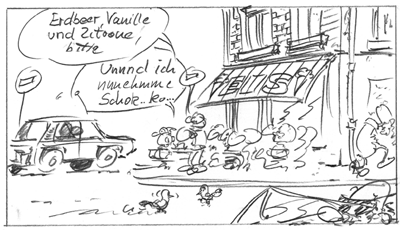Benni
A young hero who is more than just a stutterer
by The German Stuttering Association
article below written by Ulrich Natke and translated by Tim Chafer
from Germany
"Benni: So wh-wh-where's the p-problem?"
Benni: U-und? Wwwo ist das P-problem?, Demosthenes-Verlag of Bundesvereinigung Stotterer-Selbsthilfe e.V., Cologne, Germany, ISBN 3-921897-38-6
The German Stuttering Association (Bundesvereinigung Stotterer-Selbsthilfe e.V., http://www.bvss.de) serves people who stutter of all ages. For example, it organizes seminars and information events for stuttering adults and adolescents and for parents of stuttering children. In Demosthenes-Verlag, the publishing house of the German Stuttering Association, it publishes literature on the subject of stuttering. The publications are targeted at speech therapists, at people who stutter who are seeking information or who wish to help or treat themselves, and to family members and particularly the parents of stuttering children. What has been missing so far, however, was a publication aimed directly at young people who stutter aged about 12.
Books and films in which people who stutter appear generally reflect the image of the "stutterer" in society. All too often he/she is portrayed as a fool or a psychopath. The latter highlights the view widely held among laypersons that stuttering is attributable to mental problems and that people who stutter have neurotic personality traits. Despite the lack of evidence for these beliefs, stuttering adolescents are frequently the victims of prejudice. Our book now sets out to thoroughly upgrade the image of the "stutterer".
Since adolescents are not easy to reach, we hit upon the idea of producing a comic. We wanted to create a figure to identify with who, on the principle of non-avoidance, openly and confidently deals with his stutter. We wanted to avoid "lecturing" to the reader. We intended the comic to be simply amusing - even for non-stuttering readers. We also wanted to get across the notion that a stuttering adolescent can be just as communicative, confident and courageous as his non-stuttering peers. We soon agreed on "Benni" as the name of our protagonist. And for the artwork we were fortunate to be able to call on the services of my brother Bernd Natke, who is a professional comic artist. We also received funding for the project from the German Health Ministry.
We formed a small group consisting of Angelika Schindler, Birgit Schulz, Bernd Natke, Ralf Pollmann and myself and set about thinking up jokes for the comic. In order to create a lively and multi-faceted comic, we chose the format of one- and two-page comic strips. We first decided that about half the jokes shouldn't deal with stuttering. In the other jokes, stuttering should be portrayed the way that young people actually experience it, e.g. when relatives give them well-meaning advice or fellow pupils make fun of them. One of these of comic strips actually shows how confident Benni gets his own back on a fellow pupil who ridicules him. Incidentally, the stylistic device of the running joke pervades the entire book. We created a total of 15 comic strips on the subjects of school, homework, girls and well-meaning relatives.

Our artist placed the joke ideas in typical comic settings. He produced preliminary drafts for discussion and revision. The finished artwork was then produced, initially without dialogue. When all the artwork was completed, we thought up preliminary dialogues for the comic strips and distributed them to adolescents so that we could gauge their response. All the jokes went down well, even if some of the kids laughed in places we hadn't intended to be funny. One or two changes were made to the text, and the book was finally printed.
Benni Is Available Online Here
Over 1,200 copies of "Benni" have now been sold. There has been plenty of praise and little criticism. One stuttering adolescent complained that Benni stuttered too much. He counted the number of stuttering moments and arrived at a stuttering rate which, in his opinion, was too high.
As it has turned out, Benni is purchased by people of all ages. Even adults find Benni amusing. The parents of younger stuttering children use the comic as a way of making stuttering into a discussible topic. One mother told us that she had looked at the comic together with her 7 year-old son with whom she had never before talked about his stutter. She explained that it made it easier for her to raise the subject. Some therapists order the comic in large numbers and distribute it as standard literature to their younger patients.
The way Benni copes with his stutter is not necessarily realistic for all adolescents. But he does encourage readers to think about alternative ways of reacting and dealing with their own stutter. We believe the book was worth the effort and hope that Benni will reach many more readers. We are currently planning volume 2 of Benni, which is scheduled for publication next year.
Acknowledgment
I should like to thank Tim Chafer for the translation of this text.

